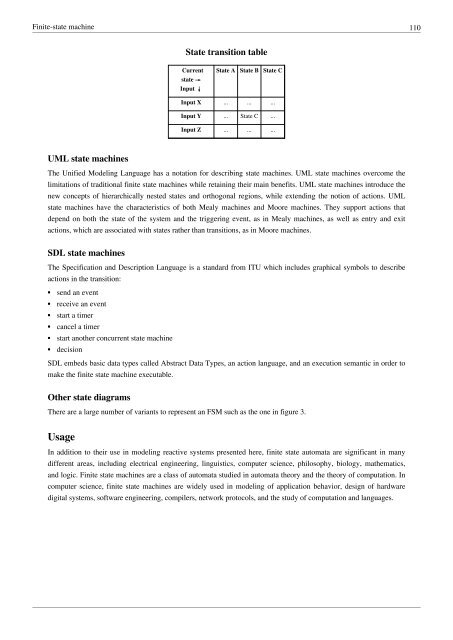Internet Protocol - Research by Kirils Solovjovs
Internet Protocol - Research by Kirils Solovjovs
Internet Protocol - Research by Kirils Solovjovs
Create successful ePaper yourself
Turn your PDF publications into a flip-book with our unique Google optimized e-Paper software.
Finite-state machine 110<br />
UML state machines<br />
State transition table<br />
Current<br />
state →<br />
Input ↓<br />
State A State B State C<br />
Input X ... ... ...<br />
Input Y ... State C ...<br />
Input Z ... ... ...<br />
The Unified Modeling Language has a notation for describing state machines. UML state machines overcome the<br />
limitations of traditional finite state machines while retaining their main benefits. UML state machines introduce the<br />
new concepts of hierarchically nested states and orthogonal regions, while extending the notion of actions. UML<br />
state machines have the characteristics of both Mealy machines and Moore machines. They support actions that<br />
depend on both the state of the system and the triggering event, as in Mealy machines, as well as entry and exit<br />
actions, which are associated with states rather than transitions, as in Moore machines.<br />
SDL state machines<br />
The Specification and Description Language is a standard from ITU which includes graphical symbols to describe<br />
actions in the transition:<br />
• send an event<br />
• receive an event<br />
• start a timer<br />
• cancel a timer<br />
• start another concurrent state machine<br />
• decision<br />
SDL embeds basic data types called Abstract Data Types, an action language, and an execution semantic in order to<br />
make the finite state machine executable.<br />
Other state diagrams<br />
There are a large number of variants to represent an FSM such as the one in figure 3.<br />
Usage<br />
In addition to their use in modeling reactive systems presented here, finite state automata are significant in many<br />
different areas, including electrical engineering, linguistics, computer science, philosophy, biology, mathematics,<br />
and logic. Finite state machines are a class of automata studied in automata theory and the theory of computation. In<br />
computer science, finite state machines are widely used in modeling of application behavior, design of hardware<br />
digital systems, software engineering, compilers, network protocols, and the study of computation and languages.


